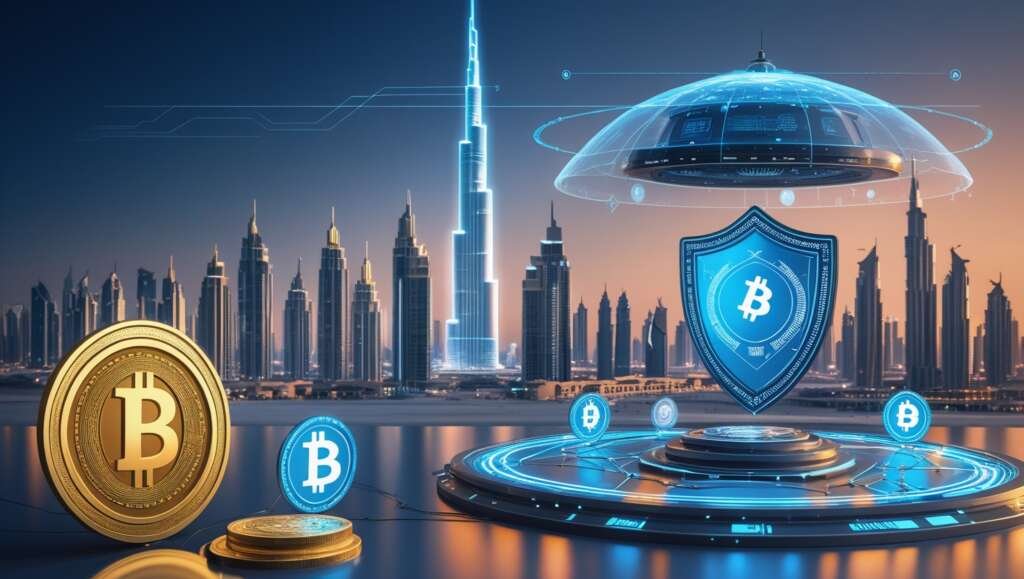If you follow cryptocurrency news, especially in the Middle East, you’ve likely heard about Dubai’s big push to become a global crypto hub. Known for its innovation and finance, Dubai has recently taken a major step by creating one of the world’s first clear and dedicated regulatory frameworks for cryptocurrencies and virtual assets.
This early move has helped Dubai stand out as a leader in the digital asset space, attracting investors, startups, and global businesses eager to be part of its growing market.
The journey began when Dubai’s government and financial authorities not only saw the huge potential of blockchain and digital currencies but also recognized the risks involved. At first, the Dubai Financial Services Authority (DFSA) worked on regulating crypto within the Dubai International Financial Centre (DIFC), a special financial zone.
However, as crypto markets grew quickly beyond these zones, it became clear that Dubai needed a more focused regulator. That’s how the Virtual Assets Regulatory Authority (VARA) was created in March 2022.
VARA is a dedicated body responsible for overseeing Dubai’s entire virtual asset industry. Its main job is to set clear rules, supervise companies, and issue licenses for crypto businesses. By doing this, VARA aims to build trust and transparency in a fast-moving and sometimes risky market.
With VARA in place, Dubai is positioning itself as a safe and attractive place for crypto companies and investors, helping to drive the future of digital finance in the region and beyond.
What is VARA?
Alright, so VARA stands for Virtual Assets Regulatory Authority. Think of VARA as Dubai’s very own crypto police. It is the official government body in Dubai that keeps an eye on everything crypto-related in the region and it is responsible for regulating all virtual asset activities, including cryptocurrencies, stablecoins, NFTs, and tokenized real-world assets.
Unlike traditional financial regulators that cover banks or securities, VARA specializes in the unique needs and risks of the crypto and blockchain markets. Its mission is to make Dubai’s virtual asset sector safe, secure, and competitive on a global level — essentially, ensuring the party remains fun and safe.
What Crypto Services Does It Regulate?
VARA offers only 7 types of licenses, each specially designed to fit a specific set of requirements. Here’s a quick breakdown of what each license covers:
-
Advisory Services
Helping people and businesses understand virtual assets by giving advice, sharing market insights, and guiding investment strategies — but not actually buying, selling, or holding crypto for them.
-
Broker-Dealer Services
Acting as a middleman to help clients buy or sell crypto, including big over-the-counter (OTC) trades, making sure there’s enough liquidity, and following rules like Anti-Money Laundering (AML) and Know Your Customer (KYC).
-
Custody Services
Safely storing crypto assets for clients, using super-secure methods like cold storage to protect from hacks, handling transactions, and sometimes offering insurance for those assets.
-
Exchange Services
Running the platforms where users can trade crypto instantly, offering different trading pairs (like crypto-to-crypto or fiat-to-crypto), keeping markets fair and transparent, and enforcing security and compliance checks.
-
Lending and Borrowing Services
Allowing users to lend their crypto to earn interest or borrow crypto by putting up assets as collateral — managing loans, interest, and risks if someone can’t pay back.
-
Virtual Asset Management and Investment Services
Managing crypto investments for clients, including funds and portfolios, doing market research, building investment strategies, and making sure everything follows the rules.
-
Virtual Asset Transfer and Settlement Services
Helping move crypto from one party to another securely and quickly, making sure transactions are verified, safe, and comply with anti-money laundering and other laws.
Note: VARA doesn’t cover things like derivatives trading (futures, options) or issuing new tokens (like ICOs or STOs).
What Does VARA Actually Do?
VARA’s role goes beyond simply creating rules. It provides a range of critical services to ensure the crypto ecosystem in Dubai operates smoothly:
-
Licensing Crypto Businesses
VARA requires all companies operating in the crypto space within Dubai to obtain a license. Whether it’s an exchange, wallet provider, crypto fund, or NFT platform, businesses must meet stringent criteria on security, transparency, and risk management to qualify.
VARA checks if these businesses are legit, secure, and not just some shady operation trying to scam people. So basically, they’re the bouncers who ensure only reputable, well-managed companies participate in Dubai’s market.
-
Ongoing Monitoring and Compliance
Getting a license is just the start. VARA doesn’t just give out licenses and forget about you. Nope, they keep monitoring companies to make sure they don’t start acting shady later. They enforce anti-money laundering (AML) rules, make sure everyone knows their customer (KYC), and keep an eye out with regular reviews of companies’ operations, perform audits, and investigate suspicious activities.
-
Setting the Rules of the Game
VARA publishes comprehensive guidelines covering everything from how to protect customer funds, prevent fraud, disclose investment risks, and manage complaints. These standards establish a clear and transparent framework for market participants. It’s like giving everyone the rulebook before the game starts.
-
Consumer Protection
Crypto can be confusing and risky, especially if you’re new. VARA steps in to protect everyday investors by making sure companies are honest about fees, risks, and security. And if things go wrong? VARA’s there to help sort out complaints and disputes.
-
Supporting Innovation
But VARA isn’t just about rules and regulations. They get that crypto innovation moves fast. So they offer things like “regulatory sandboxes,” which is a fancy way of saying “safe playgrounds” where new crypto projects can test their ideas without breaking everything.
How Hard is it to Get a License?
Since VARA started in late 2022, they’ve been moving fast — but they don’t mess around. Getting a license with VARA is kind of like trying out for a very picky, very serious team. The licensing process typically involves:
- Initial application and submission of detailed business plans
- Background checks and verification of founders and key personnel
- Assessment of technical infrastructure, security measures, and compliance programs
- Ongoing reporting requirements once licensed
Due to its thoroughness, VARA is recognized as one of the most stringent and rigorous regulatory authorities in the crypto space. Many companies face a rigorous review process that can take several months, reflecting VARA’s high standards for safety and compliance.
VARA’s Connection to International Regulations
Dubai’s crypto regulator does not operate in isolation. VARA aligns its regulations with international standards to ensure global compliance and facilitate cross-border cooperation.
VARA closely follows guidelines from organizations such as the Financial Action Task Force (FATF), ensuring its AML and CFT rules meet global standards. It also coordinates with other national regulators and international bodies to combat fraud, money laundering, and market manipulation.
This international alignment makes Dubai’s crypto market more trustworthy for global investors and opens doors for partnerships with foreign exchanges, custodians, and service providers.
How VARA Helps Make Crypto Safer in Dubai
With its broad regulatory reach and strict supervision, VARA plays a crucial role in enhancing crypto safety:
- Reduces Scams and Fraud: By licensing only trustworthy firms and monitoring ongoing compliance, VARA filters out bad actors who might defraud investors.
- Prevents Money Laundering: Strict KYC and AML requirements make it harder for criminals to misuse the crypto market.
- Protects Investors: Clear rules on disclosures, risk management, and fund security help investors understand what they’re getting into and keep their money safer.
- Boosts Transparency: Reporting and auditing requirements ensure a more open market where activities are visible and trustworthy.
- Builds Global Trust: Aligning with international rules and standards makes Dubai a reliable and attractive destination for crypto investment.
What Does This Mean for Everyday Crypto Users?
If you’re a retail investor or user, VARA’s work means you can be more confident using Dubai-based crypto platforms. Licensed companies are held to high standards, so the chances of fraud or unexpected losses are lower.
Plus, if you have a complaint or face a problem, VARA provides a channel for seeking resolution, adding a layer of consumer protection which is not always present in unregulated markets.
Looking Ahead: VARA’s Role in Dubai’s Crypto Future
Dubai’s got big dreams of becoming a top player in the blockchain and digital assets game. VARA isn’t just sitting back — it’s constantly updating its rules and support systems to keep pace with the latest tech and market trends.
Sure, crypto is exciting, but it’s also a bit like a rollercoaster ride with some serious twists and turns. That’s where VARA steps in, helping to keep things balanced by protecting investors while still encouraging innovation. By licensing trustworthy companies, enforcing the rules, and pushing for transparency, VARA is making Dubai’s crypto scene safer and smarter — a win for investors, businesses, and everyday users.
With the crypto world changing at lightning speed, having a regulator that’s both strict and forward-thinking is a big reason why Dubai is quickly becoming one of the coolest and safest spots to trade and invest in digital assets.
So, with all this progress, the real question is: Are you ready to jump on Dubai’s crypto train?




